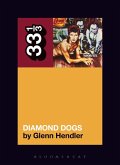In the '80s, the Birmingham, England, band Duran Duran became closely associated with new wave, an idiosyncratic genre that dominated the decade's music and culture. No album represented this rip-it-up-and-start-again movement better than the act's breakthrough 1982 LP, Rio. A cohesive album with a retro-futuristic sound-influences include danceable disco, tangy funk, swaggering glam, and Roxy Music's art-rock-the full-length sold millions and spawned smashes such as "Hungry Like the Wolf" and the title track.
However, Rio wasn't a success everywhere at first; in fact, the LP had to be buffed-up with remixes and reissued before it found an audience in America. The album was further buoyed by colorful music videos, which established Duran Duran as leaders of an MTV-driven second British Invasion, and the group's cutting-edge visual aesthetic. Via extensive new interviews with band members and other figures who helped Rio succeed, this book explores how and why Rio became a landmark pop-rock album, and examines how the LP was both a musical inspiration-and a reflection of a musical, cultural, and technology zeitgeist.
However, Rio wasn't a success everywhere at first; in fact, the LP had to be buffed-up with remixes and reissued before it found an audience in America. The album was further buoyed by colorful music videos, which established Duran Duran as leaders of an MTV-driven second British Invasion, and the group's cutting-edge visual aesthetic. Via extensive new interviews with band members and other figures who helped Rio succeed, this book explores how and why Rio became a landmark pop-rock album, and examines how the LP was both a musical inspiration-and a reflection of a musical, cultural, and technology zeitgeist.
Containing new interviews with four of the original five band members along with commentary from colleagues and former label execs and radio programmers of that period, the Rio book offers a behind-the-scenes making of the album and song analysis as well the record's enduring popularity decades later. Forbes









